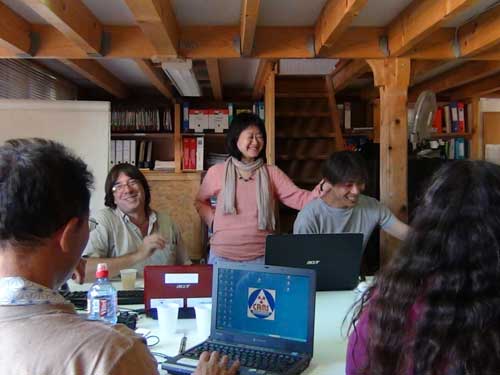 |
|
During a meeting (Person in the center is Ms. Marumori)
|
In Japan we are faced with a big question: "What should we do to protect children from radioactive contamination resulting from the disaster at Tokyo Electric Power's Fukushima Daiichi nuclear power plant?"
The greatest possible efforts are urgently needed in Fukushima Prefecture to protect children not only from external radioactive exposure attributed to the reactor explosions, but also from internal exposure due to contaminated food and water,.
However, government actions have been passive and belated. Authorities have started surveys, but have not announced specific protection measures, which should have been presented for all possible risks. We believe that the following actions are necessary to minimize radioactive risks, but none of them has been implemented - prioritized distribution of clean drinking water to children for an extended period of time, indications of detailed radioactive-contamination data on food items, creation of a food distribution system to deliver less contaminated food preferentially to children, and creation of recreation facilities which will also serve as shelters.
Mothers with small children strongly desire that the authorities take prompt actions to implement protective and preventive measures and protect children, rather than perform surveys. What the authorities should do is create an environment where residents can relax, not try to bluff residents by repeating "Relax, relax." Under conditions where this desire has not been realized, what should the citizens living in municipalities neighboring evacuated and high-radiation areas do to protect children?
We established the Citizens' Radioactivity Measurement Station (CRMS) based on the idea that, to protect children's health, we should not wait for authorities to take action but take preventive measures on our own.
CRMS is an independent organization that provides tools to enable citizens themselves to take measurements with which to protect themselves, to become informed about radioactive protection, and to make their own judgments. The tools include measurement, data collection and disclosure, cooperation with experts, establishment of measurement stations, training in measurement skills, and information concerning external and internal radioactive exposure.
CRMS was founded thanks to the dedication of Wataru Iwata, a member of the Measurement Group of the Fukushima Network for Saving Children from Radiation (Children Fukushima Network), which is a Fukushima-based group of citizens. The CRMS office is located next to the Fukushima Information Center for Saving Children from Radiation. The Information Center was a realization of the commitment of Aya Marumori, inspired by Chernobyl citizens' efforts to protect human rights and health (such as the establishment of citizens' health clinics, organization of recreation camps, and establishment of the Chernobyl Information Center). Marumori is a member of the Radioactive Protection Group of the Children Fukushima Network and the author of this article. The first CRMS food radiation detector was donated by Ryuichi Hirokawa (journalist and editor-in-chief of "Days Japan", the monthly photojournalism magazine), who purchased it from the France-based CRIIRAD (Commission for Independent Research and Information on Radioactivity). CRMS now awaits the donation of five more food radiation detectors and one whole body counter. We also plan to establish more CRMS sites in municipalities other than Fukushima City.
CRMS has been measuring radioactivity in food for citizens on a daily basis since the period of preparations for its opening. CRMS has also been organizing children's health counseling events regularly, in cooperation with pediatrician Makoto Yamada (representative of the National Network of Pediatricians for Protecting Children from Radiation). We hope to organize such events in cooperation with sincere physicians living in Fukushima Prefecture.
CRMS is supported by the Days Japan Radiation Detector Project Support Fund, Fukushima Children's Fund, large numbers of donations, and volunteer staff. The Fukushima Daiichi disaster has not yet been resolved. To protect the future of children living in an environment where radioactive contamination is omnipresent, CRMS is making continued efforts to find better protective and preventive measures.

